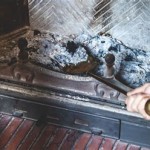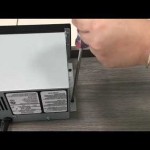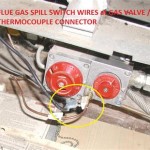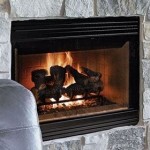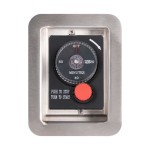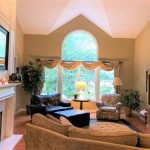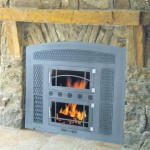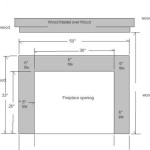Mobile Home Fireplaces: Safety, Installation, and Considerations
Mobile homes, also known as manufactured homes, present unique challenges when it comes to installing and operating fireplaces. Due to their construction materials and size limitations, fireplaces in mobile homes require careful planning and adherence to specific regulations. This article explores the key considerations, safety regulations, and available options for incorporating a fireplace into a mobile home.
Understanding Mobile Home Construction and Regulations
Mobile homes are built to the Federal Manufactured Home Construction and Safety Standards (HUD Code), which differs significantly from building codes for site-built homes. These standards address fire safety, structural integrity, and energy efficiency, with specific requirements for heating appliances. Unlike traditional homes that often use brick or concrete for fireplace construction, mobile homes necessitate lightweight and approved materials. Any fireplace installation must comply with the HUD Code, along with any applicable state and local regulations. Failure to adhere to these regulations can result in safety hazards, void warranties, and legal repercussions.
The primary concern is fire safety. Mobile homes typically have less space and utilize different construction materials compared to conventional homes. This means there is a higher risk of fire spread if a fireplace is not properly installed and maintained. Flammable materials used in walls, ceilings, and floors necessitate specific clearances and non-combustible barriers around the fireplace and chimney. Ventilation is also critical. A properly functioning chimney or vent is essential to remove combustion byproducts, preventing carbon monoxide poisoning and other health risks.
Before any fireplace installation, it is crucial to consult with a certified mobile home installer or contractor familiar with HUD Code requirements. This professional can assess the structural integrity of the home, the feasibility of the installation, and ensure compliance with all applicable regulations. They can also guide the homeowner in selecting a suitable fireplace type and provide expert installation services.
Fireplace Options for Mobile Homes
Several fireplace options are available for mobile homes, each with its advantages and disadvantages. The choice depends on factors such as budget, space constraints, desired aesthetics, and installation complexity.
Electric Fireplaces: Electric fireplaces are a popular choice for mobile homes due to their ease of installation and safety features. They do not require venting and can be plugged into a standard electrical outlet. Electric fireplaces produce heat through electric resistance, simulating the appearance of a real flame using LED lights or other technologies. They offer realistic flame effects and adjustable heat settings, providing both ambiance and supplemental heating. However, electric fireplaces typically provide less heat than other types and rely on electricity, which can result in higher energy bills, particularly when used as the primary heating source.
Propane and Natural Gas Fireplaces: These options offer a more authentic fireplace experience with real flames. However, they require professional installation to ensure proper venting and gas line connections. Propane fireplaces use bottled propane gas, while natural gas fireplaces connect to a natural gas line. Both types provide significant heat output and can be thermostatically controlled for consistent temperature. Proper ventilation is crucial to prevent carbon monoxide buildup. These fireplaces must be installed by a qualified technician who can ensure compliance with safety regulations and proper sealing of the vent system.
Ethanol Fireplaces: Ethanol fireplaces burn liquid ethanol fuel, producing a real flame without requiring a chimney or flue. They are relatively easy to install and can be positioned against a wall or even placed on a tabletop. Ethanol fireplaces offer a clean-burning and environmentally friendly option, as they produce minimal smoke or ash. However, they provide less heat than gas or wood-burning fireplaces and require careful handling of the ethanol fuel. It is essential to follow the manufacturer's instructions and safety precautions when refueling and operating an ethanol fireplace.
Safety Considerations for Mobile Home Fireplaces
Regardless of the fireplace type, safety should be the paramount concern. Regular maintenance and adherence to safety guidelines are essential to prevent fires and ensure the well-being of occupants.
Clearance to Combustibles: Maintain adequate clearance between the fireplace and any combustible materials, such as furniture, curtains, and wall coverings. Consult the manufacturer's specifications for recommended clearances. Install non-combustible barriers or shields if necessary to protect nearby surfaces from heat.
Smoke and Carbon Monoxide Detectors: Install and maintain working smoke and carbon monoxide detectors in the mobile home. Test the detectors regularly and replace the batteries as needed. These devices provide early warning in case of a fire or carbon monoxide leak, allowing occupants to evacuate safely.
Regular Inspection and Maintenance: Regularly inspect the fireplace, chimney, and vent for any signs of damage or deterioration. Clean the chimney or vent annually to remove creosote buildup, which can increase the risk of chimney fires. Have a qualified technician inspect gas lines and connections periodically to ensure they are leak-free. Proper maintenance extends the lifespan of the fireplace and prevents potential hazards.
Proper Venting and Air Supply: Ensure the fireplace has adequate venting to remove combustion gases. A blocked or improperly installed vent can lead to carbon monoxide poisoning. Wood-burning fireplaces require an adequate supply of fresh air for proper combustion. Consider installing an outside air kit to provide a dedicated air supply for the fireplace.
Fire Extinguishers: Keep a working fire extinguisher readily available near the fireplace. Learn how to use the fire extinguisher properly and ensure that all household members are familiar with its operation. A fire extinguisher can help to contain a small fire before it spreads, minimizing damage and preventing injuries.

Maintaining Prefabricated Home Fireplaces Clayton Studio

Maintaining Prefabricated Home Fireplaces Clayton Studio

Modular Homes With Fireplaces Clayton Studio

Maintaining Prefabricated Home Fireplaces Clayton Studio
A Spectacular Double Wide Manufactured Home Makeover Mobile Living

Mobile Home Remodeling Ideas Homes Manufactured Remodel
A Spectacular Double Wide Manufactured Home Makeover Mobile Living

Modular Homes With Fireplaces Clayton Studio

Maintaining Prefabricated Home Fireplaces Clayton Studio

Can Manufactured Homes Have Fireplaces Fireplace Tips
Related Posts

